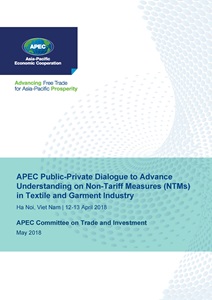
Proceedings
APEC Workshop on Promoting Decarbonization of Power Sector by Using Carbon-Free Energy (CFE)
The Asia-Pacific Economic Cooperation (APEC) is a regional economic forum established in 1989 to leverage the growing interdependence of the Asia-Pacific.
The Asia-Pacific Economic Cooperation (APEC) is a regional economic forum established in 1989 to leverage the growing interdependence of the Asia-Pacific.
APEC ensures that goods, services, investment and people move easily across borders. Members facilitate this trade through faster customs procedures at borders; more favorable business climates behind the border; and aligning regulations and standards across the region.
APEC ensures that goods, services, investment and people move easily across borders. Members facilitate this trade through faster customs procedures at borders; more favorable business climates behind the border; and aligning regulations and standards across the region.
APEC works to help all residents of the Asia-Pacific participate in the growing economy.
APEC works to help all residents of the Asia-Pacific participate in the growing economy.
Capacity building projects play an important role in helping translate APEC's goals into reality.
Capacity building projects play an important role in helping translate APEC's goals into reality.

Proceedings
•September 2018
Download Report
3MB
Published Under
Committee on Trade and Investment (CTI)
Accessed
11307
Pages
11
This report summarizes the discussions during the APEC Public-Private Dialogue to Advance Understanding on Non-tariff Measures (NTMs) in Textile and Garment Industry held in Ha Noi, Viet Nam on 13-14 April this year.
The project is aimed at the following objectives: (i) Exploring and stocktaking the application of NTMs in Textile and Garment in existing RTAs/FTAs in APEC, other regions as well as in the WTO to identify and bridge the gaps among APEC members in the issues in efforts to realize the FTAAP; (ii) Provide capacity building to APEC governmental officials on NTMs in Textile and Garment to deal with NTMs negotiation in their on-going RTAs/FTAs negotiation, as well as to regulate NTMs in Textile and Garment sector in reality; and (iii) Making recommendations to CTI for further consideration and action on this issue.

